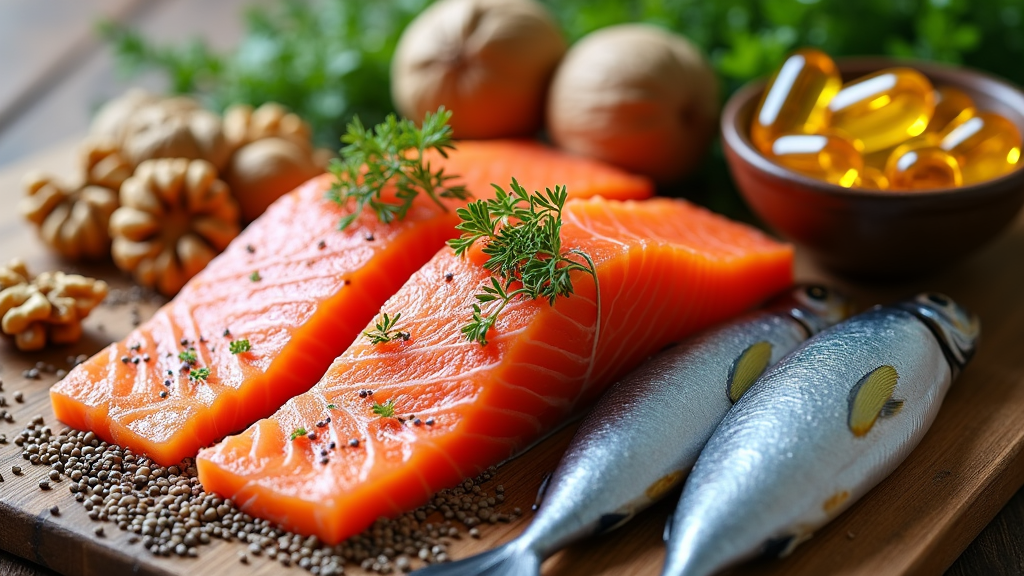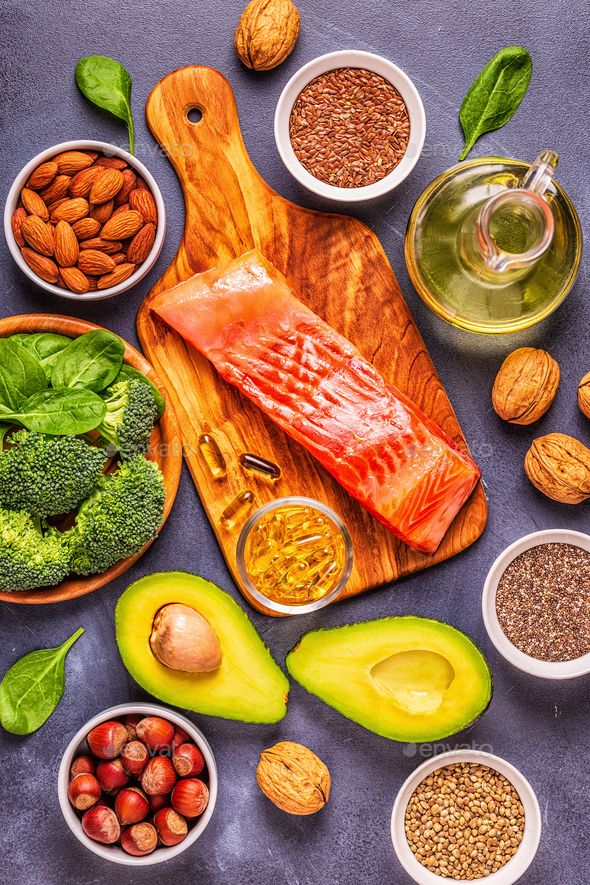 Adding years to your life isn’t just about genetics. What you eat can play a really big role too. I’ve found that omega3s, a type of healthy fat you get mostly from fish and some seeds, stand out as one of those simple things you can add to your routine with a bunch of long-term benefits. These healthy fats are linked with a lower risk of heart disease, a sharper brain, smoother joints, and, excitingly, maybe even a slower rate of biological aging.
Adding years to your life isn’t just about genetics. What you eat can play a really big role too. I’ve found that omega3s, a type of healthy fat you get mostly from fish and some seeds, stand out as one of those simple things you can add to your routine with a bunch of long-term benefits. These healthy fats are linked with a lower risk of heart disease, a sharper brain, smoother joints, and, excitingly, maybe even a slower rate of biological aging.
If you’re curious how something as straightforward as omega3 could make such a difference, there’s some cool science behind it. New research is checking out how omega3 might keep you healthier for longer and even help your body “age” more slowly at a molecular level. Pretty wild, right?
Here’s what I’ve learned about omega3, why it matters if you want to stay healthy as you get older, and how to actually work it into your everyday life. Plus, some practical tips you can start today.
The Basics: What Are Omega3s and Why Do They Matter?
Omega3s are a family of polyunsaturated fatty acids. Your body doesn’t make them on its own, so getting them from your food is super important. The main types are ALA (found in plants), EPA, and DHA (both are found in fatty fish like salmon and mackerel). Out of these, EPA and DHA tend to pack the biggest punch for your heart, brain, and body overall.
Everyday Benefits of Omega3s
- Supports heart health. Helps keep cholesterol and blood pressure in check.
- Boosts brain power. Linked to better memory and less mental decline as you age.
- Keeps joints moving. Can help cut down stiffness and joint discomfort.
- Supports eye health. Good for your vision, especially as you get older.
Adding omega3s to your daily routine is pretty easy, and the payoff can be huge for how you feel now and years down the line. In fact, some evidence suggests these healthy fats help tone down inflammation throughout your body, giving you another layer of support as you age.
The New Science: Omega3s and Living Longer
You probably know about omega3 for your heart, but its role in how fast you “age” isn’t as widely talked about. I came across a recent study that really grabbed my attention. In Switzerland, researchers studied over 700 adults aged 70 and older to see if daily omega3, vitamin D, or regular exercise (or combos of the three) would help slow down the body’s aging at a deep, cellular level.
The Study That Turned Heads
- 777 older adults took part in an experiment lasting three years, led by Heike BischoffFerrari, Steve Horvath, and their team.
- Each person was randomly assigned to eight different groups. They used approaches like 2,000 IU of vitamin D daily, 1 gram of omega3 daily, and/or a 30minute home workout three times a week.
- The scientists measured changes in biological age using “epigenetic clocks,” which basically look at specific markers on your DNA tied to aging.
What Did Omega3 Do?
People who took 1 gram of omega3 every day saw a moderate but real slowdown in biological aging, up to four months based on those molecular markers. Men and women, folks of different body sizes and ages, all showed this benefit. The best part: the combination of omega3, vitamin D, and exercise slowed aging even more. It wasn’t just about looking at a calendar year. Their blood tests actually showed a difference, hinting at real, meaningful results for participants.
More Than Just Aging Slower
There was another layer. The combo of omega3, vitamin D, and regular exercise not only helped slow aging but appeared to drop the risk of frailty (getting weaker with age) and even certain cancers. According to the research team, each of these tools works differently in your body, but together, they reinforce each other for a stronger effect. Read more about this study in Science Translational Medicine.
To really get a sense of why this matters, think about how most aging problems (like frailty or memory loss) show up when your cells lose steam or get damaged. Omega3, along with movement and the right vitamins, may give cells some extra resilience, helping you stay independent and active longer. Researchers are still checking out all the ways these changes play out, but the big takeaway is that these are habits anyone can work into their life—no crazy measures needed.
How Much Omega3 Should You Get?
The sweet spot for the study was 1 gram (1,000 mg) of combined EPA and DHA omega3 each day. For most healthy adults, the American Heart Association recommends two servings of fatty fish per week (about 3.5 ounces each), but many people still fall short of that amount. If you don’t eat much fish, an omega3 supplement can help you fill that gap and keep your health goals on track.
Good Sources of Omega3s
- Fatty fish such as salmon, sardines, mackerel, and anchovies
- Chia and flax seeds (for ALA, but less potent than fish-based omega3)
- Walnuts
- Fish oil or algal oil supplements
If you go for a supplement, look for “purified” or “concentrated” formulas. Make sure it’s thirdparty tested, so you know what you’re actually getting. You should also ask your doctor about adding omega3, especially if you’re on meds that could interact with it.
Keep in mind: getting omega3 from whole food sources also provides protein and other key nutrients. Building healthy meals around fish dishes, nutty oatmeal, and seed-based snacks will give your nutrition an extra boost.
Pair Omega3 With Other Healthy Habits
Getting the biggest benefit isn’t about one miracle nutrient. That Swiss study really makes it clear. Combining omega3 with daily vitamin D and movement works better than any one of them alone. Here’s a quick summary of how to get started:
- Omega3: Aim for a gram a day from fish or supplements.
- Vitamin D: Lots of adults need a supplement since it’s tricky to get from food. A blood test can let you know where you stand.
- Move your body: 30 minutes of brisk walking, yoga, or home exercise three times a week is enough to make a difference according to research.
The trifecta of good fats, strong vitamin D status, and regular exercise sets you up for better energy, a healthier heart, and, according to the research, a slower biological clock.
Increasing your movement can be as simple as walking your dog, stretching in the morning, or trying a beginner-friendly online workout video. Just getting started is what matters most.
Potential Questions and Real-Life Tips
Do plantbased omega3s do the same thing?
ALA, which comes from flax, chia, and walnuts, is still good for you, but your body doesn’t turn it into EPA and DHA very efficiently. If you’re vegetarian or vegan, try algal oil supplements for EPA and DHA sourced from algae.
Can you get too much omega3?
For most people, the amount studied (1 gram a day) is safe. Higher doses might thin your blood, so if you take blood thinners or have a bleeding disorder, ask your doctor.
What about mercury in fish?
Most health organizations say that for adults, the benefits of eating fish far outweigh mercury risks if you stick to lowermercury types such as salmon, sardines, and anchovies.
How soon will you feel results?
When it comes to slowing aging, the changes take time. You might notice quicker benefits like softer skin or better joint comfort, but the real perks for your heart and brain are long-term. Staying consistent with your intake brings the best payoff.
Putting Omega3 Into Your Routine
Making omega3 a regular thing doesn’t have to be complicated or expensive. Here are a few ways I work it into my week:
- Grill or bake salmon once a week. Leftovers go great tossed into salads or bowls.
- Sprinkle chia or flax on smoothies, oatmeal, or yogurt for a quick ALA boost.
- Take a purified fish oil supplement—it’s quick and hasslefree.
- Try swapping tuna for sardines or mackerel (more omega3, less mercury!)
Pair these habits with 30minute walks and a reliable source of vitamin D, and you’re on your way to supporting a healthier you, today and years down the road. If you want an added bonus, try making a few fishbased recipes: salmon patties for lunch or a sardine avocado toast for a snack. Mixing these up in your rotation means you get more taste and health perks without getting bored.
Your Personal Long-Life Checklist
- Add omega3 either from fish, seeds, or a highquality supplement.
- Get your vitamin D checked and supplement if needed.
- Stay active. Aim for at least three sessions per week.
Staying young at the cellular level comes down to a bunch of small, doable habits rather than shortcuts. Omega3 is definitely worth a spot on your healthyaging checklist. Curious what other steps could help you feel your best as you get older? Drop me a comment and let’s swap ideas! Remember, with some small shifts in your daily routine, you can set yourself up for a healthier, longer, and more energetic future.

